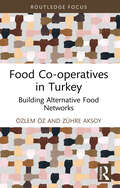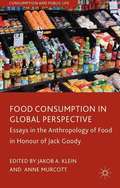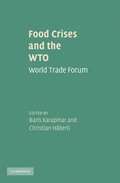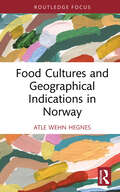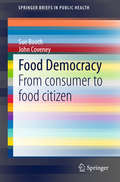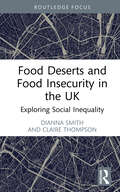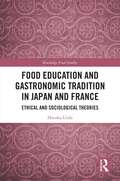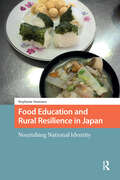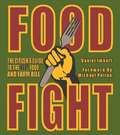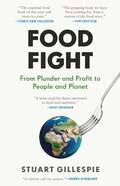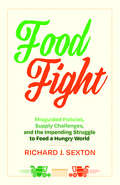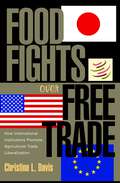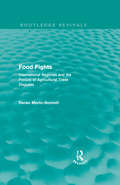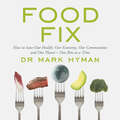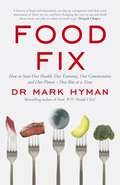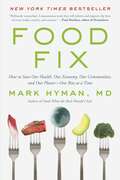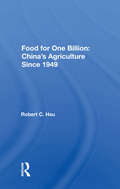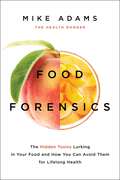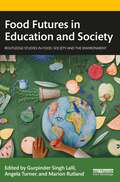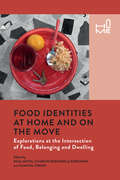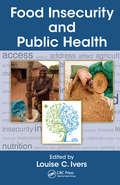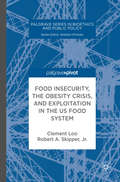- Table View
- List View
Food Chemistry in Small Bites: The Alchemist in the Kitchen
by Patricia B O'HaraFood Chemistry in Small Bites takes readers on an up-close scientific journey through the transformation of food when meals are prepared. Organized in bite-size, digestible units, this innovative text introduces students to food's molecular makeup as well as the perception of food by the five senses. Using familiar foods as examples, it explores what happens to ingredients when heated, cooled, or treated and also considers what happens when materials that don’t naturally mix are forced to do so. With informative, full-color renderings and a hands-on lab section, the book encourages students to think like scientists while preparing delicious dishes. Readers will formulate hypotheses as to why certain foods taste hot despite being at room temperature, why milk separates into curds and whey when lemon is added, and other ordinary but chemically complex phenomena. This book also importantly challenges readers to think critically about the future of food in the face of a warming planet.
Food Co-operatives in Turkey: Building Alternative Food Networks (Routledge Focus on Environment and Sustainability)
by Özlem Öz Zühre AksoyThis book addresses the roles played by food co-operatives in the attempt to build alternative food networks, drawing on an in-depth analysis of case studies in Turkey. While many existing studies focus on food co-operatives and alternative food networks in the Global North, this book provides an important insight into a country from the Global South and, in doing so, not only provides a novel perspective but also challenges the rigid North–South categorization. The book provides a rounded view by examining both a producer and a consumer co-operative: BÜKOOP is a university-based consumer food co-operative, and the Vakıflı co-operative is a food-producing co-operative located in the Hatay province on the Mediterranean coast of Turkey. These two co-operatives, which have been working together for more than ten years, share the dream of establishing a network of co-operatives, in which producers exist in solidarity with consumers, blurring the dichotomy of producer versus consumer as well as rural versus urban. In addition to contributing towards a better understanding of the urban–rural divide, within the framework of alternative food networks, the in-depth analysis of these two cases enables us to explore how food co-operatives develop and how they keep their commitment to their original goals and ideals so as to help build an alternative food system. The lessons we learn from these two working case examples highlight the successes and areas of improvement for food co-operatives. They also provide evidence against the pessimism about alternative food networks by demonstrating that co-operatives can democratize both production and consumption. This book will be of interest to students and scholars studying alternative food networks, food justice, food sovereignty, transformation towards sustainable food systems, social movements, and the urban–rural divide.
Food Consumption in Global Perspective
by Jakob A. Klein Anne MurcottWith studies of China, India, West Africa, South America and Europe, this book provides a global perspective on food consumption in the modern world. Combing ethnographic, historical and comparative analyses, the volume celebrates the contributions of Jack Goody to the anthropology of food.
Food Crises and the WTO
by Baris Karapinar Christian HäberliThe food and financial crises of 2008 and 2009 have pushed millions more people into poverty and hunger, while changing the parameters of international trade. Both crises have also challenged the fundamentals of WTO rules regulating agriculture, which had been designed to combat trade distortions due to artificially low-priced food commodities. This collection of essays examines to what extent the multilateral trading system contributes to food security in today's volatile markets. Bringing together a renowned group of expert economists, lawyers, environmental and development specialists, it offers a fresh and multi-dimensional perspective combining a strong economic analysis with a comprehensive legal assessment of the interface between food security and international trade regulation. Together, the contributions provide concrete policy recommendations on how the WTO could play a positive role in preventing or mitigating future food crises and promote global food security.
Food Cultures and Geographical Indications in Norway (Routledge Focus on Environment and Sustainability)
by Atle Wehn HegnesThis book analyses the implementation and challenges of using Geographical Indications in Norway. Adapting the modern and global system of Geographical Indications (GIs) to food cultures is a recurring challenge. This text uses Norway as a case study to describe, understand, and explain the socio-cultural adaptation of GIs. The empirical analysis shows that administrators, producers, consultants, and others make a significant effort to adapt the scheme to Norwegian food culture and the food culture to the scheme. Through the development and use of a new conceptual framework, the book continues to show how adaptations occurred and their influence on the development of the Norwegian food culture. The author also reflects upon the status of Norwegian GIs in emerging food cultural contexts related to sustainable and technology change. In summary, this book exhibits the connection between modern global legislative arrangements and traditional local products, providing a springboard for further research on cultural adaptation work of GIs in established and future global food cultures. This book will be of interest to researchers, policymakers, and students in agri-food studies, sociology of food and agriculture, agricultural and rural development, and cultural studies.
Food Democracy
by John Coveney Sue BoothThis book explores the links between food and democracy. It addresses how democratic principles can be used to shape our food system and takes a practical 'how-to' approach to using democratic processes to regain control of the food we eat. It also highlights what food democracy looks like on the ground and how individuals, communities and societies can be empowered to access, cook and eat healthy food in ways that are sustainable. Food democracy, as a concept, is a social movement based on the idea that people can and should be able to actively participate in shaping the food system rather than being passive spectators. The book is useful for university and advanced TAFE courses that cover topics examining food in health sciences, social sciences and other areas of study. It is also relevant to health practitioners, nutritionists, food advocates, policy makers and others with a keen interest in exploring an alternative to the industrial food system known as "Big Food. "
Food Deserts and Food Insecurity in the UK: Exploring Social Inequality (Routledge Focus on Environment and Sustainability)
by Claire Thompson Dianna SmithThis book examines the social inequalities relating to food insecurity in the UK, as well as drawing parallels with the US. Access to food in the UK, and especially access to healthy food, is a constant source of worry for many in this wealthy country. Crises, such as the COVID-19 pandemic, have coincided with a steep rise in the cost of living, meaning household food insecurity has become a reality for many more households. This book introduces a new framework to examine the many influences on local-level food inequalities, whether they result from individual circumstances or where a person lives. The framework will allow researchers new to the field to consider the many influences on food security, and to support emerging research around different sub-topics of food access and food security. Providing a thorough background to two key concepts, food deserts and food insecurity, the book documents the transition from area-based framing of food resources, to approaches which focus on household food poverty and the rise of food banks. The book invites researchers to acknowledge and explore the ever changing range of place-based factors that shape experiences of food insecurity: from transport and employment to rural isolation and local politics. By proposing a new framework for food insecurity research and by drawing on real-world examples, this book will support academic and applied researchers as they work to understand and mitigate the impacts of food insecurity in local communities. This book will be of great interest to students and scholars of food and nutrition security, public health, and sociology. It will also appeal to food policy professionals and policymakers who are working to address social inequalities and improve access to healthy and nutritious food for all.
Food Education and Food Technology in School Curricula: International Perspectives (Contemporary Issues in Technology Education)
by Angela Turner Marion RutlandThis book draws together the perceptions and experiences from a range of international professionals with specific reference to food education. It presents a variety of teaching, learning and curriculum design approaches relating to food across primary, secondary and vocational school education, undergraduate initial teacher education programs, and in-service professional development support contexts. Contributions from authors of a variety of background and countries offer insight into some of the diverse issues in food education internationally, lessons to be learned from successes and failures, including action points for the future. The book will be both scholarly and useful to teachers in primary and secondary schools.
Food Education and Gastronomic Tradition in Japan and France: Ethical and Sociological Theories (Routledge Food Studies)
by Haruka UedaDrawing on ethical and sociological theories of food, this book presents a new approach to food education that moves beyond nutrition-centred education. Food education has gained increasing scientific and political importance in many countries as a promising way to change contemporary eating. However, many practices fail to address two epistemological obstacles regarding its very components – ‘food’ and ‘education’. Food has largely been thought of from a nutritionistic viewpoint alone and the ethical issues over children’s freedom of choice and well-being have been absent. This book resolves these problems by applying ethical and sociological theories of food and analysing food education in two pioneering countries: Japan and France. The book focuses on taste education and gastronomy as two key concepts which have great potential to positively impact food education. Taste education is a promising alternative to nutrition-centred pedagogy which foregrounds the experience and pleasure of eating food, creating an environment for taste sensibility and food curiosity. From taste education, the picture can be broadened to examine the role and impact of gastronomy in food education. Examining the cultural traditions of France and Japan reveals how gastronomy can impact eating habits and food cultures and how these criteria should be an intrinsic part of food education. The book concludes by constructing an integrative theory for food education that moves beyond nutrition-centred education for the benefit of one’s well-being. This book will greatly interest students, scholars, policymakers and educators working on food education, food-related issues at the intersection between nutritional and social sciences, and ‘gastronomes’ searching for a pedagogical guide for developing their capabilities to eat in a more humanistic way.
Food Education and Rural Resilience in Japan: Nourishing National Identity (Consumption and Sustainability in Asia)
by Stephanie AssmannFood education initiatives exist worldwide, but Japan remains unique with its food education law known as shokuiku. The country’s impressive health metrics — high life expectancies, low obesity, and affordable health care — often lead observers to praise this approach. This book presents a more nuanced analysis. First, it challenges the assumption that food education is wholly a “good thing” by exposing underlying power mechanisms. Through food diagrams, food fairs, and school lunch programs, government ministries promote both nationalism and traditional gender roles. Second, it explores how food education operates in Japan’s rural regions, where educators champion resilience and food self-sufficiency to alleviate depopulation and economic decline. This emphasis on local food persisted even in the aftermath of the 2011 Fukushima nuclear disaster. Using Foucault’s concept of governmentality, historical contextualization, and extensive fieldwork in rural Japan, this study reveals the complex political agenda driving food education in a non-Western society.
Food Fight
by Michael Pollan Daniel Imhoff Fred KirschenmannOur Chance to Right the Food System:Every five to seven years, Congress passes a little understood legislation called the Farm Bill. To a large extent, the Farm Bill writes the rules and sets the playing field for America's contemporary food system, determining what we eat, how much it costs, and where it is grown. You may not be happy with what you learn.With concise and witty analysis, historical framing, dozens of charts, illustrations, and photographs, this newly updated edition of Food Fight deconstructs this complex and fundamental policy and will spur you to action.YOU'LL LEARN ABOUTThe Farm Bill's connection to a national obesity epidemic...Environmental implications of corn-based ethanol expansion...Who wins and who loses from heavily subsidized industrial agriculture...The myths of "cheap food"...45 million Americans who face hunger on a regular basis...A nationwide food movement based on public health, local farms, and stewardship...If you eat, pay taxes, care about the health of our children and communities, the fate of family farmers, or our country's food security, this book is for you.
Food Fight: From Plunder and Profit to People and Planet
by Stuart Gillespie"Scholarly, literate and deeply moving, this isn't just a good read, it's an essential reference for anyone hoping to understand the food system, why it's broken and how we might imagine fixing it."—Chris Van Tulleken, author of Ultra-Processed PeopleFood is life but our food system is killing us. Designed in a different century for a different purpose—to mass-produce cheap calories to prevent famine—it&’s now generating obesity, ill-health and premature death. We need to transform it, into one that is capable of nourishing all eight billion of us and the planet we live on. In Food Fight, Stuart Gillespie reveals how the food system we once relied upon for global nutrition has warped into the very thing making us sick. From its origins in colonial plunder, through the last few decades of neoliberalism, the system now lies in the tight grip of a handful of powerful transnationals whose playbook is geared to profit at any cost. Both unflinching exposé and revolutionary call to arms, Food Fight shines a light inside the black box of politics and power and, crucially, maps a way towards a new system that gives us hope for a future of global health and justice.
Food Fight: Misguided Policies, Supply Challenges, and the Impending Struggle to Feed a Hungry World
by Richard J. SextonSociety's most basic challenge is arguably to produce and distribute enough food for its citizens. In 2023, 733 million people faced hunger and 2.3 billion were moderately or severely food insecure. Feeding a growing world population is becoming more difficult in the face of climate change, pest resistance to traditional treatments, and misguided government policies that limit how much food ends up on our plates. Policies to support biofuels, organic agriculture, local foods, and small farms and to oppose genetically modified foods all reduce food production on existing land. This leads to higher food prices, increased carbon emissions, and less natural habitat as cropland expands. Food Fight documents the challenges to adequately feeding the world in the twenty-first century and illustrates the ways in which contemporary food policies in the United States, Europe, and beyond imperil food security. Richard J. Sexton provides a window into the world of modern agriculture and food supply chains. He separates the wheat from the chaff to distinguish policies that will limit, or expand, the global food supply, and he explains how we can construct a food system that forestalls future hunger and environmental degradation.
Food Fights over Free Trade: How International Institutions Promote Agricultural Trade Liberalization
by Christina L. DavisThis detailed account of the politics of opening agricultural markets explains how the institutional context of international negotiations alters the balance of interests at the domestic level to favor trade liberalization despite opposition from powerful farm groups. Historically, agriculture stands out as a sector in which countries stubbornly defend domestic programs, and agricultural issues have been the most frequent source of trade disputes in the postwar trading system. While much protection remains, agricultural trade negotiations have resulted in substantial concessions as well as negotiation collapses. Food Fights over Free Trade shows that the liberalization that has occurred has been due to the role of international institutions. Christina Davis examines the past thirty years of U.S. agricultural trade negotiations with Japan and Europe based on statistical analysis of an original dataset, case studies, and in-depth interviews with over one hundred negotiators and politicians. She shows how the use of issue linkage and international law in the negotiation structure transforms narrow interest group politics into a more broad-based decision process that considers the larger stakes of the negotiation. Even when U.S. threats and the spiraling budget costs of agricultural protection have failed to bring policy change, the agenda, rules, and procedures of trade negotiations have often provided the necessary leverage to open Japanese and European markets. This book represents a major contribution to understanding the negotiation process, agricultural politics, and the impact of international institutions on domestic politics.
Food Fights: International Regimes and the Politics of Agricultural Trade Disputes (Routledge Revivals)
by Renée Marlin-BennettFirst published in 1993, this title explores the underlying ideologies and decision-making procedures that codify the rules of the post-World War II liberal, now defunct Soviet socialist, mercantilist and South preferential trade regimes. Food Fights presents a rich case study and rigorous data analysis of organised agrictultural trade that uncovers similarities between these diverse economic systems and identifies the principle trends governing the new global economy.
Food Fix: How to Save Our Health, Our Economy, Our Communities and Our Planet – One Bite at a Time
by Mark HymanOur most powerful tool to reverse the global epidemic of chronic disease, heal the environment, reform politics, and revive economies is food. What we eat has tremendous implications not just for our waistlines, but also for the planet, society, and the global economy. What we do to our bodies, we do to the planet; and what we do to the planet, we do to our bodies.In Food Fix Mark Hyman explains how our food and agriculture policies are corrupted by money and lobbies that drive our biggest global crises: the spread of obesity and food-related chronic disease, climate change, poverty, violence, educational achievement gaps, and more. He provides solutions for citizens, businesses, and policy makers to create a healthier world, society, and planet.Pairing the latest developments in nutritional and environmental science with an unflinching look at the dark realities of the global food system and the policies that make it possible, Food Fix is a passionate call to arms that will change the way you think about - and eat - food forever.(P) 2020 Hachette Audio
Food Fix: How to Save Our Health, Our Economy, Our Communities and Our Planet – One Bite at a Time
by Mark HymanOur most powerful tool to reverse the global epidemic of chronic disease, heal the environment, reform politics, and revive economies is food. What we eat has tremendous implications not just for our waistlines, but also for the planet, society, and the global economy. What we do to our bodies, we do to the planet; and what we do to the planet, we do to our bodies.In Food Fix, New York Times best-selling author Mark Hyman explains how food and agriculture policies are corrupted by money and are driving a global crises: the spread of obesity and food-related chronic disease, climate change, poverty, violence, educational achievement gaps, and more. He provides solutions for citizens, businesses, and policy makers to create a healthier world, society, and planet.Pairing the latest developments in nutritional and environmental science with an unflinching look at the dark realities of the global food system and the policies that make it possible, Food Fix is a passionate call to arms that will change the way you think about - and eat - food forever.'If you're overwhelmed by the scale of the world's problems, and wondering what you can do in your own life to start, Food Fix is for you. Dr. Hyman deftly connects the dots between education, health, climate science, and the food we eat every day, showing that the choices we make about the food we put on our plates has consequences that ripple around the world.' - Arianna Huffington
Food Fix: How to Save Our Health, Our Economy, Our Communities, and Our Planet--One Bite at a Time
by Dr. Mark HymanHelp to transform the planet in crisis with this indispensable guide to healthy, ethical, and economically sustainable food from #1 New York Times bestselling author Mark Hyman, MD -- "Read this book if you're ready to change the world" (Tim Ryan, US Representative).Food is our most powerful tool to reverse the global epidemic of chronic disease, heal the environment, reform politics, and revive economies. What we eat has tremendous implications not just for our waistlines, but also for the planet, society, and the global economy. What we do to our bodies, we do to the planet; and what we do to the planet, we do to our bodies.In Food Fix, #1 bestselling author Mark Hyman explains how our food and agriculture policies are corrupted by money and lobbies that drive our biggest global crises: the spread of obesity and food-related chronic disease, climate change, poverty, violence, educational achievement gaps, and more.Pairing the latest developments in nutritional and environmental science with an unflinching look at the dark realities of the global food system and the policies that make it possible, Food Fix is a hard-hitting manifesto that will change the way you think about -- and eat -- food forever, and will provide solutions for citizens, businesses, and policy makers to create a healthier world, society, and planet.
Food For One Billion: China's Agriculture Since 1949
by Robert C. HsuThis book examines the agricultural policies and programs adopted by the Chinese leadership since 1949 and analyzes the role of agriculture in China's changing development strategies. Dr. Hsu gives particular attention to the measures intended to improve agricultural technology and to the sources of funds for agricultural investment. He concludes that, although the collective system has been effective in mobilizing China's rural resources for agricultural development and in promoting progress in labor-intensive agricultural technology, periodic extreme leftist policies and interference by rural party cadres have caused various kinds of inefficiency, offsetting the advantages gained from collective farming. This is the first book to systematically analyze the ways in which China's agricultural development is being financed. By critically examining the level and nature of state resources allocated to agriculture, the author challenges the view that China has pursued an agriculture-first strategy of economic development since the early 1960s.
Food For The Hungry: The Reluctant Society
by Judith A. SegalFood for the Hungry: The Reluctant Society by Judith Segal Series:Policy studies in employment and welfare
Food Forensics: The Hidden Toxins Lurking in Your Food and How You Can Avoid Them for Lifelong Health
by Mike AdamsWhat's really in your food? Award-winning investigative journalist and clean food activist Mike Adams, the "Health Ranger," is founder and editor of Natural News, one of the top health news websites in the world, reaching millions of readers each month. Now, in Food Forensics, Adams meticulously tests groceries, fast foods, dietary supplements, spices, and protein powders for heavy metals and toxic elements that could be jeopardizing your health. To conduct this extensive research, Adams built a state-of-the-art laboratory with cutting-edge scientific instruments. Publishing results of metal concentrations for more than 800 different foods, Food Forensics is doing the job the FDA refuses to do: testing off-the-shelf foods and sharing the findings so the public can make informed decisions about what they consume or avoid. In Food Forensics, you'll discover little-known truths about other toxic food ingredients such as polysorbate 80, MSG, sodium nitrite, pesticides, and weed killers such as glyphosate. Adams reveals stunning, never-before-reported details of heavy metals found in recycled human waste used on crops and in parks, and he explains how industrial pollution causes mercury, lead, and cadmium to end up in your favorite protein powders. This book will forever change your view of food safety, regulation, and manufacturing. When you know what's really in your food, you can start making changes to protect yourself against serious diseases like cancer, all while maximizing your natural immune defenses against infection and disease.
Food Futures in Education and Society (Routledge Studies in Food, Society and the Environment)
by Angela Turner Gurpinder Singh Lalli Marion RutlandThis book brings together a unique collection of chapters to facilitate a broad discussion on food education that will stimulate readers to think about key policies, recent research, curriculum positions and how to engage with key stakeholders about the future of food. Food education has gained much attention because the challenges that influence food availability and eating in schools also extend beyond the school gate. Accordingly, this book establishes evidence-based arguments that recognise the many facets of food education, and reveal how learning through a future's lens and joined-up thinking is critical for shaping intergenerational fairness concerning food futures in education and society. This book is distinctive through its multidisciplinary collection of chapters on food education with a particular focus on the Global North, with case studies from England, Australia, the Republic of Ireland, the United States of America, Canada and Germany. With a focus on three key themes and a rigorous food futures framework, the book is structured into three sections: (i) food education, pedagogy and curriculum, (ii) knowledge and skill diversity associated with food and health learning and (iii) food education inclusivity, culture and agency. Overall, this volume extends and challenges current research and theory in the area of food education and food pedagogy and offers insight and tangible benefits for the future development of food education policies and curricula. This book will be of great interest to students, scholars, policymakers and education leaders working on food education and pedagogy, food policy, health and diet and the sociology of food.
Food Identities at Home and on the Move: Explorations at the Intersection of Food, Belonging and Dwelling (Home Ser.)
by Raúl Matta Charles-Édouard de Suremain Chantal CrennHow does food restore the fragmented world of migrants and the displaced? What similar processes are involved in challenging, maintaining or reinforcing divisions between groups coexisting in the same living place? Food Identities at Home and on the Move examines how ‘home’ is negotiated around food in the current worldwide context of uncertainty, mobility and displacement. Drawing on empirical approaches to heritage, identity and migration studies, the contributors analyse the relationship between food and the various understandings of home and dwelling. With case studies on sushi around the world, food as heritage in the Afghan diaspora and Mexican foodways in Chicago, these chapters offer novel readings on the convergence of food and migration studies, the anthropology of space and place and the field of mobility by focusing on how entangled stories of food and home are put on display for constructing the present and imagining the future.
Food Insecurity and Public Health
by Louise IversAffecting more than 800 million people, food insecurity is a global problem that runs deeper than hunger and undernutrition. In addition to the obvious impact on physical well-being, food insecurity can result in risky coping strategies, increased expenditures on medical costs or transportation, and mental health issues. A review of the concepts an
Food Insecurity, the Obesity Crisis, and Exploitation in the US Food System
by Clement Loo Robert A. Skipper Jr.This book argues that the factors contributing to obesity as a product of food insecurity have risen largely from the exploitation of vulnerable communities. In the past, food insecurity has been understood as primarily a matter of famine, hunger, and undernutrition. Such an understanding is no longer accurate: food insecurity is now also associated with obesity, the rates of which have increased dramatically in the past thirty years, particularly among lower-income communities and communities of color. This is likely the result of changes in the food system, including the reduction of access to fresh produce. Governments and intergovernmental bodies are therefore justified in more vigorously and directly intervening in the food system to ensure that communities have access to foods that contribute to better public health outcomes.

